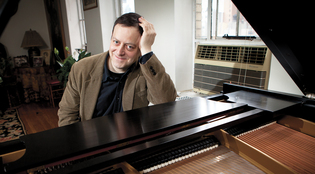 loading
loading
Where They Are NowA composer's journeysFinding inspiration from Broadway to Bali.  Julie BrownComposer Jeffrey Stock ’88 is shown here in his Manhattan apartment, but his work—and his attempts to escape it—has taken him to northern Greenland and Bali. View full image
Composer Jeffrey Stock ’88 has written works ranging from an operetta about Prohibition to an instrumental piece (Lulie the Iceberg) based on a children's book. Stock, who lives in Manhattan, has won a Guggenheim Fellowship and a Jonathan Larson Grant. He wrote the music and lyrics for A Room With a View, a new musical that premieres in March at San Diego's Old Globe Theatre. Y: How did you decide to adapt E. M. Forster's A Room With a View? S: That was the idea of my collaborator, Marc Acito, who's writing the book to the musical. I thought it was a brilliant idea. There was something about it when I read it. I thought, I can hear these people singing. Y: What were some of the stumbling blocks in adapting the book? S: The main character is very complicated. Her name is Lucy Honeychurch, and she goes to Italy on a tour. The basic premise is that there's the suitable man, the one with social standing, and there's the one who's perhaps slightly lower class. It's a love triangle: does she choose the match she's supposed to have or does she choose her heart? It's not like she's in an incredibly repressive family; she does have choice. So one has to ask: why doesn't she choose her heart? It seems to be internal resistance rather than external resistance, and that's what's difficult to put on stage. So a lot of work that the novel does in its way, music does in a different way. Y: The music of Beethoven figures prominently in Forster's work, both in Howard's End and A Room With a View. S: I base an entire song on the final movement of the Tempest sonata. I start with the Beethoven and I weave it through the number. Executing it was very tricky, because this Beethoven piece was written for piano and not for voice. Y: The Old Globe in San Diego has incubated several shows that have gone to Broadway—Into the Woods, The Full Monty. It's sort of like New Haven was in the old days. S: San Diego is a first step, and who knows what will be next? I think there's a chance we could have a life back east. The thing about Broadway is, there's so many factors out of your control. In the old days, there were lots of new musicals every season. That just doesn't happen anymore. Now there's just a handful. You can't just wait around planning to go to Broadway: you have to write the music you love, and the world will have many places for it to come to life. Y: When did you first know you wanted to write musicals? S: It was my freshman year. I was at a production at the Yale Dramat, of West Side Story. I remember it so vividly, I was in a flood of tears, and I thought: this is it. Whatever this is, I want to be a part of it. Y: You did have a show go to Broadway once before, 1997's Triumph of Love. S: Certainly when you reach Broadway, it's sort of like the pinnacle. It's like you're a part of history now: this is where Gershwin did his shows, where Rodgers and Hammerstein did their shows. You're in that line, whatever small part you play. It's like someone making their major league debut: they may or may not hit a home run, but they played in the major leagues, and you can never take that away from them, and they enter all the statistical books. Y: After Triumph of Love, you wrote Lulie the Iceberg,an instrumental piece performed by Yo-Yo Ma and others in 1998. How did you research the piece? S: I spent an intense few weeks in northern Greenland, where nothing grows, one of the loneliest places on earth. The music that ended up in my piece was the sounds of the place: the birds, the ice. Ice is incredibly noisy. I thought ice was just this dead thing, but when you go to the Arctic, it's tinkling and groaning and cracking and shattering and bubbling. The ice is alive. Y: In 1999, at the peak of your success, you up and moved to Bali for a year. Why? S: I just said, I need to do something else. I'd never been to Bali. I wasn't quite sure where it was. I'd heard about it. It was just something I had in my head, so when I had the idea to do something different, I just thought: I'm gonna go to the farthest place there is. I'm gonna get a one-way ticket and see what happens—see, when you take away the music, what's left of me. I just fell in love with Bali. I became fluent in Balinese. I moved into a little village there that adopted me. I worked with my hands; I studied mask making and wood carving. Y: You mentioned Rodgers and Hammerstein. South Pacific has that famous number, "Bali Ha'i." S: A lot of people do think about that when I mention Bali, though that isn't about Bali but rather the South Pacific, thousands of miles away. But I saw the Broadway revival, and that song was so beautiful, and I remember I had two conflicting emotions. Part of me just wanted to leave everything behind, just to go back to Bali permanently and get away. The other part of me was like: they've created such a beautiful world that all I want to do is write a musical as good as this.
The comment period has expired.
|
|